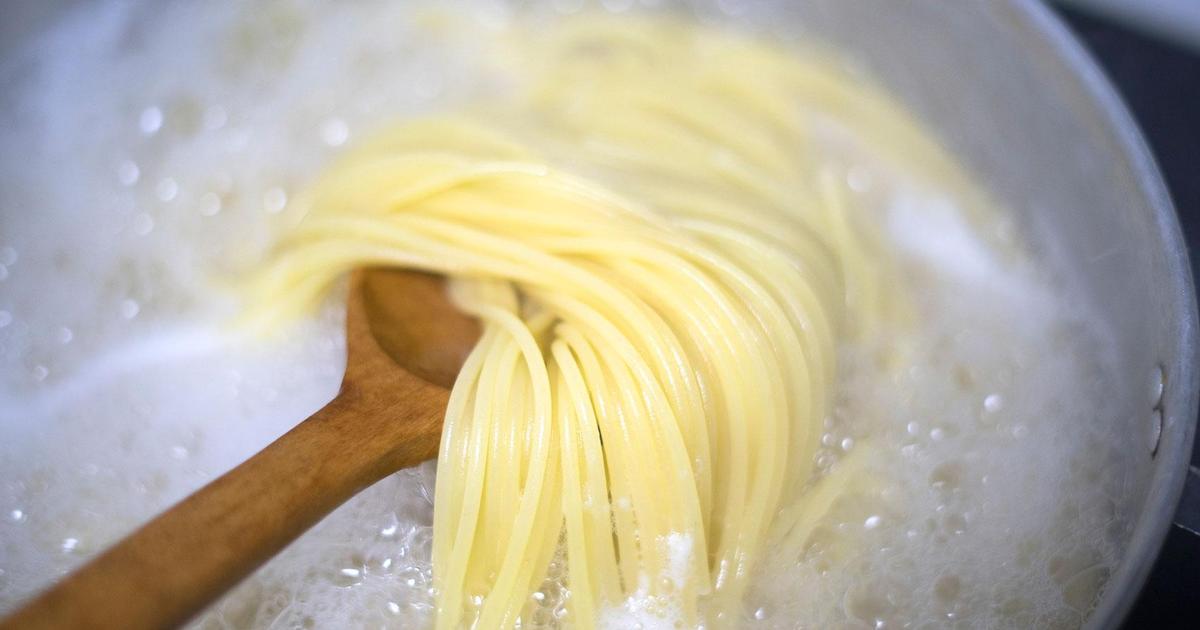In the fridge, a teaspoon acts as a cork on your bottle of champagne that you started when you were old?
It is absolutely useless.
Just like a pinch of salt or a drizzle of lemon juice to help the eggs stiffen.
Molecular cuisine chemist Raphaël Haumont (1) explains why these tricks are nonsense.
You will never cook the same way again.
Read also > >
These culinary aberrations that are transmitted from generation to generation
The wooden spoon to prevent the water from overflowing
Wooden spoon or not, if the water in our pot should overflow, it will overflow.
When the water boils and the bubbles rise, some explode on contact with the utensil placed above the saucepan.
But this is not enough to ensure that the water will not overflow.
"The real solution would be to control the temperature, to cook over very low heat, or else, to stir constantly," advises the specialist.
In video, the culinary myths that you should no longer believe
Cook in boiling water
What cooking temperature?
An egg cooked at 65°C.
But 80°C will be enough to cook a vegetable or starchy food such as rice, pasta or semolina.
Although all budding cooks immerse their pasta in boiling water and let it simmer while cooking, this is not necessary.
Indeed, the liquid, when it boils, reaches 100°C, a temperature that is too high for the majority of ingredients.
"Keeping water boiling throughout cooking alters the texture of the cooked food", emphasizes Raphaël Haumont.
Thus, the pasta will be more rubbery than if it is cooked at 80°C, its ideal temperature.
The teaspoon in the champagne bottle
"Put the tail of a teaspoon in the neck of the bottle before placing it in the fridge", whisper many parents when clearing the table after a festive meal.
And yet, it is completely unnecessary.
"The metal does not retain the gas, says the chemist. The real trick would be to put the liquid under pressure. In a siphon, for example."
But where does this myth come from?
At the time, when the customer wanted to keep a bottle in a restaurant, the waiter put a spoon inside the neck, as a label.
"This technique preserved the "property" of the wine and not the wine itself", relates the specialist.
Eggs at room temperature for a successful mayonnaise
Mayonnaise is the result of an emulsion.
Whether the preparation is hot or cold, the change in texture will be the same.
"The consistency of Hollandaise sauce is the same as that of mayonnaise," says the expert.
Therefore, an egg, whether fresh from the fridge or not, will have the same effect.
To whisk your egg whites
Full screen
Egg whites won't whip up any easier with a pinch of salt.
iStock
The myth says that by adding a pinch of salt to egg whites, the electric charge of the condiment would connect to those contained in the proteins of the egg to whip the egg whites more easily.
"Totally false", according to Raphaël Haumont who advises rather to work his triceps or to bring an effective robot.
Vinegar for successful poached eggs
The poached egg is the dish reserved for elite cooks according to some novices, who, despite the dose of vinegar added to the boiling water, never succeed.
It's normal.
Vinegar does not make preparation any easier.
"To make a successful poached egg, you have to swirl very hot water around before breaking it in. The heat will be more than enough".
Butter the mold vertically
If the amateur cook has never thought about how to butter his mold, the belief is tenacious among students who always learn to butter their mold vertically when making a soufflé.
The goal?
Make it go up more easily.
"Applied vertically or not, the butter will melt during cooking. The dough does not move."
Flour your mold and fish
To ensure a perfect cake after unmolding, the layer of flour after that of butter inside the mold would be the key.
"On the contrary, assures Raphaël Haumont. The mixture of the two materials can form a fine paste and stick even more to the container".
And for cooking fish, it's the same.
"In the best of cases, when there is a lot of oil, it creates a kind of crispy layer but most of the time, the food sticks even more to the pan", he notes.
The core in the guacamole
An aperitif with friends planned at home and you do not hesitate to prepare your guacamole in the morning, before leaving for work.
Your tip: slide the pit of the avocado in the center of the preparation, in the salad bowl, so that it does not darken.
Many are those who will fall from their chairs: "It does not work, says the scientist. Only antioxidants can prevent a preparation from darkening, and even if the kernel contained them, they could not spread".
The objective is to prevent oxygenation, so it is better to sprinkle the preparation with lemon juice or cover it with a very lightly oiled film.
The "seven times" rule
Turning your tongue seven times in your mouth before speaking, we knew.
In the kitchen, it would work almost the same.
You should rinse your rice seven times before cooking, or even pour the broth in seven small equal quantities to cook a risotto.
Let the less calculating among them be reassured: these are superstitions that do not improve the quality of the dish.
You were warned, cooking looks much more precise and easier now.
(1) Raphaël Haumont, chemist specializing in molecular cuisine, teacher-researcher at the University of Paris-XI (Orsay), and author.
Innovation in the kitchen
, by Raphaël Haumont and Thierry Marx, Éditions Dunod, 160 pages, €14.90.















